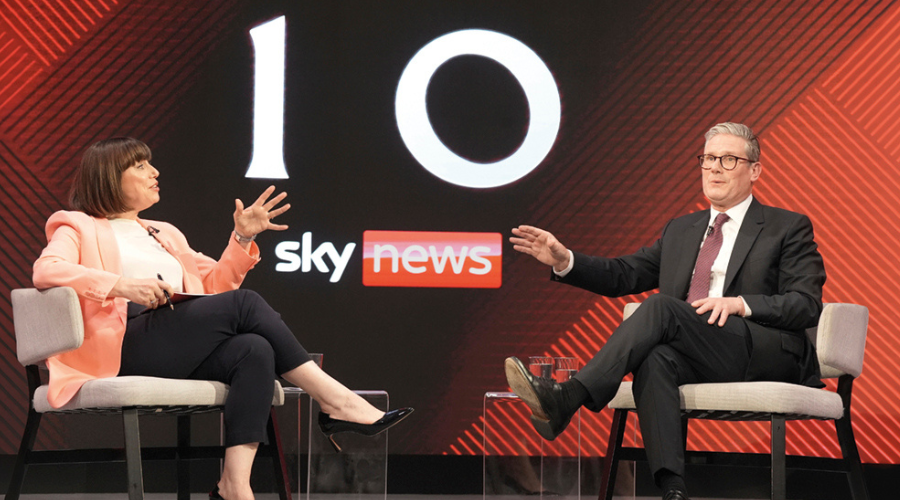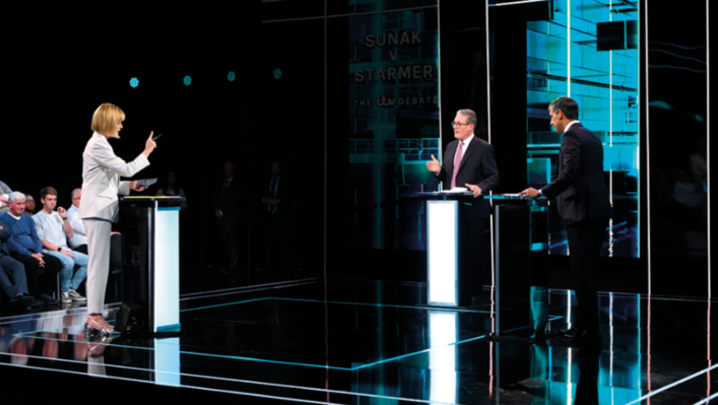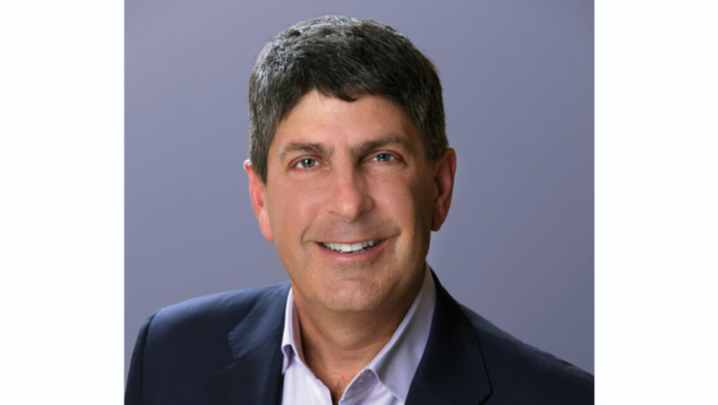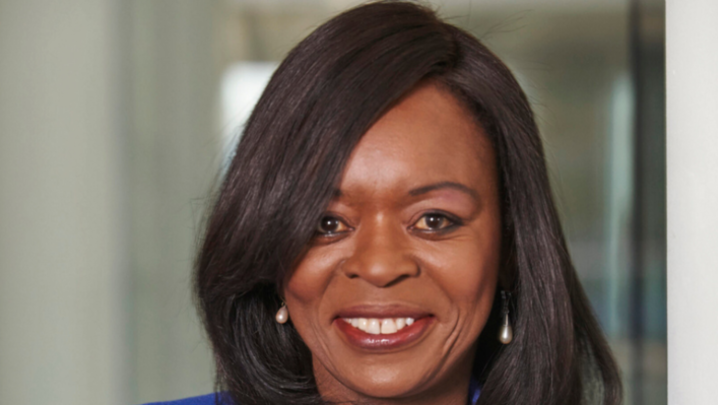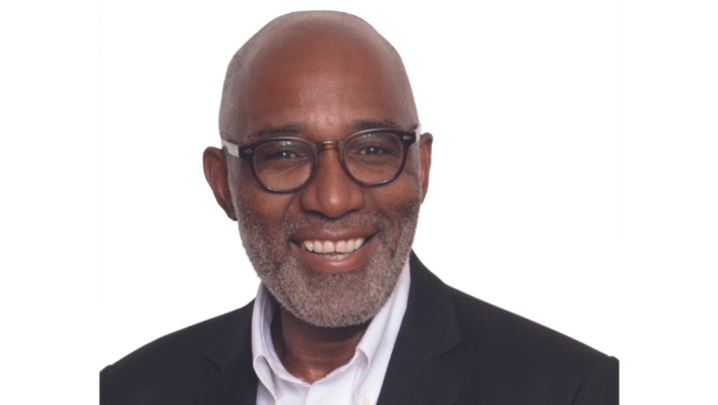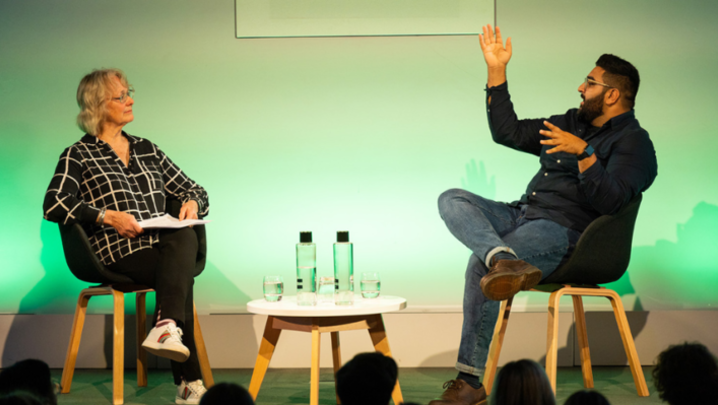John Ryley identifies key moments in a campaign psychodrama punctuated by spectacular own goals by the Conservatives
Rishi Sunak’s announcement that we would have a general election on 4 July was a big surprise to voters, journalists and even his own MPs. A high-stakes gamble. Though not a surprise for some insiders who are alleged to have bet on the timing.
In TV newsrooms that May morning most eyes had been on an earlier scandal – watching former Post Office CEO Paula Venells finally, for the first time, give her tearful, tight-lipped evidence to the public inquiry. A searing watch on a rainy day.
The rain didn’t deter Sunak. In a sodden suit he proclaimed this was “the moment for Britain to choose its future”. The soggy announcement outside Downing Street was the first in a series of spectacular own goals by the Conservatives.
Much of TV news executives’ focus is on results night, its successes and failures: the exit poll moment, the toppling of cabinet ministers and the race to be first to call the winner. After all, they have spent millions of pounds on the night’s coverage, which can make or break TV careers, on screen and off.
But the campaigns are forgotten. So, let’s select three telling moments of the TV news coverage from this long campaign ahead of the first British July election since the end of the Second World War.
Day 15: A missed story
Thursday 6 June was the turning point of the 2024 election, 80 years after D-Day. We all know it was the turning point of the 2024 election. That afternoon was the moment the Prime Minister dropped his party into the maw of a restless electorate.
Yet turning points don’t always get spotted as they are occurring.
The non-stop news channels beamed live pictures showing US President Biden, Germany’s Chancellor Scholz and France’s President Macron with Lord Cameron of Chipping Norton, the Foreign Secretary, standing shoulder to shoulder on the beach at Omaha to pay their respects to old soldiers and square up to a new dictator. Where was Sunak?
The BBC didn’t report that the Prime Minister had left early, not even on its flagship BBC News at Ten. Sky News did not mention it. But ITV News at Ten bonged it with a report from its Europe Editor.
It took a tabloid newspaper, the Labour-supporting Daily Mirror, to splash the blunder on its front page: “PM ditches D-Day” and ignite the election news agenda.
Sunak had to apologise more than once, most acutely in a pre-arranged TV interview the following morning. His aides thought Sam Coates of Sky would ask questions on a range of topics. Coates had only one target in his sights: D-Day.
This penetrating interview exposed Sunak, because his words didn’t match his body language. It’s how you apologise that matters.
Unusually, apparently, there was near total silence after the interview ended. Once Sunak walked off there was only the shuffle of the camerawoman picking up the kit. The election was over for the Conservatives – game, set and match, all testament to the power of pictures.
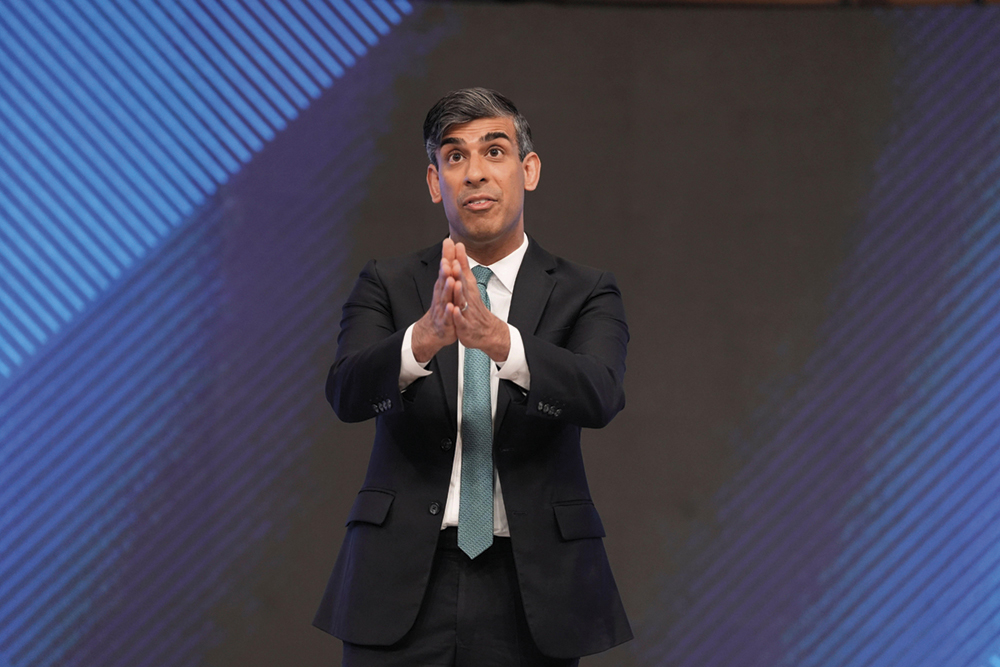
Day 21: The debates
The debates are those rare occasions in a campaign when the prime-time audience can watch how the party leaders interact with voters. Sky’s Battle for Number 10 debate programme, held in Grimsby, demonstrated how potent these events can be in corroding electors’ views of party leaders, particularly when the latter are handling hostile questions from cross voters.
Grimsby offered up a moment of pure television gold, that revealed so much about Keir Starmer’s leadership capability and his lack of agility under pressure. It lasted only a second or two. A question was put to the Labour leader from an audience member called Kayman. He asked: “Over the last year you’ve formed into being more of a politician than the person I would have voted for to run the country. You seem more like a political robot. How are you going to get others like me to vote for you?”
It was a question that goes to the heart of contemporary politics. The question startled stolid Starmer. He didn’t know whether to play off the back foot or front foot. His nervous laugh made clear he didn’t know what to say. His demeanour gave him away. For a moment he struggled. But Starmer is a lawyer, a former boss of the Crown Prosecution Service; he dug out an answer. He is, though, a lawyer for a judge not a jury.
Sky’s format at Grimsby was different to the head-to-head debates. The two leaders were interviewed separately in depth by Political Editor Beth Rigby before answering questions from a studio audience. The format works well, giving the voters at home the opportunity to hear the leaders discuss policy at length.
The BBC’s Question Time Leaders’ Special, with a similar format, was also successful in holding the politicians to account. An audience – a live, angry audience in York – questioned the leaders of the Liberal Democrats, the SNP, Labour and Conservatives for half an hour each. The Leader of the Opposition again struggled when asked, not for the first time, why he’d said Jeremy Corbyn would make a “great prime minister” and when challenged on an issue that has caused him acute political discomfort, transgender rights.
BBC One’s bad-tempered, head-to-head showdown – the last of the campaign – was the closest to the vision of the original 2010 debate. This had more time and fewer rules, allowing the two leaders, Sunak and Starmer, to debate their policy differences on immigration, taxation and welfare.
The 26 June debate will be remembered for a question from audience member Robert, who challenged both leaders: “Are you two really the best we’ve got to be the next prime minister of our great country?”
GB News billed itself as “Britain’s election channel”, yet failed to secure a televised event with both Starmer and Sunak taking part.
Instead, its hardworking Political Editor, Christopher Hope, got to interview Starmer on his own.
The start-up news organisation has been without its star turn, Nigel Farage, who belatedly announced he was taking over as leader of Reform UK and, for the eighth time, was trying to get elected as an MP, this time for Clacton-on-Sea in Essex. GB News missed him.
On the day Reform launched its party manifesto, GB News presenter Patrick Christys questioned the party’s fiscal plan by asking at the start of his programme, “Does Reform’s manifesto actually add up?”. During the campaign the channel looked like it was minding its Ofcom “Ps and Qs”.
Day 27: The betting scandal
The BBC’s broadcast exclusive of alleged illegal betting on the date of the election was an old-fashioned scoop that, unlike other political tales, cuts through with the voters. Every voter understands insider dealing: one rule for them, one rule for us, as Michael Gove put it.
The BBC’s Political Editor, Chris Mason, broke two stories in one evening; a double whammy. First, at 6.00pm, he reported that he had been tipped off that one of the PM’s close protection police officers had been suspended and arrested over alleged bets on the election timing.
Then, on BBC News at Ten, Mason revealed that a Conservative candidate, Laura Saunders, was being investigated by the Gambling Commission.
The coverage was a throwback to a linear world of journalism 25 years ago, with phrases like “as we go on air” and “tip off”, and a short package comprised only of stills and “graphicsised” statements from the betting regulator. Hard news reporting. This scandal had legs.
Conservative Central Office managed to put a spinning roulette wheel into a campaign video, then zapped it. The Director of Campaigns for the Conservative party, Saunders’s husband, took “a leave of absence”. They deny wrongdoing. All this after the PM’s close parliamentary aide, the Tory candidate in Montgomeryshire, admitted having a “flutter” on the election date.
The Election 2024 box set will be a psychodrama like no other, best approached as a sequel to the 1984 film This Is Spinal Tap – neither comedy nor reality, but a corker.
John Ryley is a former Editor-in-Chief of Sky News

